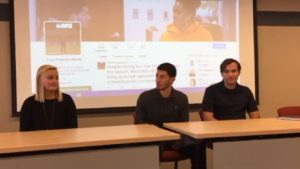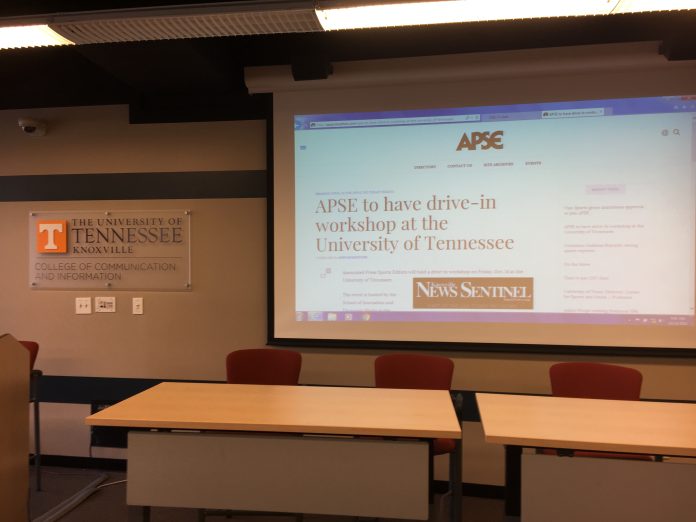Social media platforms such as Facebook and Twitter have changed the way journalists operate in today’s world, but the job description at its core remains mostly unchanged. Only the delivery systems have changed.
“There’s more urgency (now), but I still think — and I’m not talking financially — but the money, the value that we provide is not in the instant getting you the score you can get anywhere,” said Associated Press Sports Editors president and Tuscaloosa News executive sports editor Tommy Deas. “It’s the ability to analyze that (game or event) afterwards and hopefully provide expertise.”

On Oct. 14, Deas joined former APSE president and Knoxville News Sentinel sports editor Phil Kaplan at an APSE drive-in workshop at the University of Tennessee. The two sports editors focused on best practices for young journalists.
The first panel of the day was moderated by Kaplan and included Aaron Suttles of The Tuscaloosa News, Rhiannon Potkey of the Knoxville News Sentinel and Grant Ramey also of the Knoxville News Sentinel. The group focused on the challenges beat writers face in today’s world.
Recent University of Tennessee graduate, Troy Provost-Heron of The Daily Times joined University of Alabama students and Tuscaloosa News interns Terrin Waack and Tyler Waldrep, who also serve as Crimson White sports editors, to discuss the problems that arise when students have to balance both work and school.
In the final panel, Deas said expertise is being challenged by the elevation of younger journalists to positions above their experience level. Without the necessary knowledge, it makes it difficult for these journalists to offer the expert analysis that readers deserve. However, even years in the industry can’t prepare a reporter for every situation.
“I learned what a green-dog blitz was two weeks ago from (Alabama coach) Nick Saban when he brought it up and then I went and researched it,” Deas said.
Everyone attending a press conference will have access to the same quotes. In this case, it’s what additional information reporters can provide that adds value to their stories.
Sometimes that value requires expert analysis, but other times it just requires additional reporting that presents the story in a new perspective.
“Everyone’s writing about formations and offense and defense every week, and how many times could I read about how good or bad the offensive line is or (that) the secondary is struggling,” Kaplan said. “It’s an ongoing theme. It’s just, you can hit people over the head so many times with it.”
Kaplan’s solution is to produce pieces that other outlets wouldn’t think up. That’s why the Knoxville News Sentinel interviewed 11-year olds and psychologists for pieces that ran the week prior to University of Tennessee’s first win in football over the Florida Gators in 11 years.
Kaplan said developing unique enterprise articles requires his staff to look ahead and begin working on the pieces weeks before their intended deadlines.
When asked what he looks for in a future employee, Kaplan mentioned social media expertise and the ability to shoot and produce video content as two valuable tools. He has also focused on the need for his employees to understand how to cover a court case involving athletes or staff members.
Deas also named a number of things he looks for in applicants such as intelligence and a history of hard work. He also said he likes it when candidates include unique experiences on their resume. He prefers to ask applicants if those experiences taught them anything they can use to make them a better journalist.
Both sports editors have a number of expectations of their employees and neither panelist said working as a future reporter in the industry would be easy. However, the future of journalism might not be as bleak as some believe.
“I cannot imagine a world where there is not a market for information,” Deas said.




